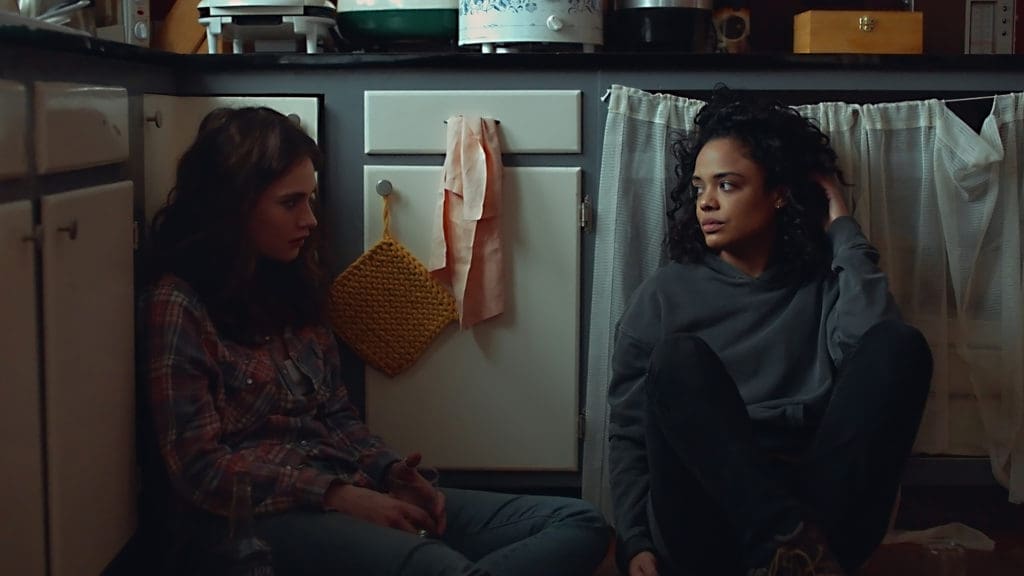
Little Woods has a lot going for it. The first feature of writer-director Nia DaCosta (also the director of next year’s Candyman remake), it stars two of Hollywood’s hottest young actresses: Tessa Thompson and Lily James. Thompson plays Ollie, a former drug runner 10 days out from the end of her probation after getting caught smuggling prescription medications across the US-Canada border. James plays her sister, Deb, who is struggling to raise her son with little help from her deadbeat ex, Ian (James Badge Dale), when she learns she’s pregnant again. Desperate to help Deb and keep the bank from foreclosing on their late mother’s home, Ollie is unwillingly drawn back into the drug world despite knowing it could jeopardize her future. It’s fertile ground for drama and while DaCosta fills her film with tension, it never feels like it quite reaches greatness.
Unfortunately, some of that is due to Thompson and James. Though James hides her natural English accent, the inflection she chooses feels generically American rather than regionally specific and Thompson doesn’t seem to try at all. It’s not a choice that would usually matter much, but make-up artist Mischa Fruge and costumer Colin Wilkes can only do so much to dim their natural star power. We never fully buy they’re just a couple of North Dakota girls down on their luck. However, the deeper problem is in the script itself.
Throughout, DaCosta can be sloppy with her character work and never seems to dig deep enough into each character’s motivations or even the reasons behind their current circumstances. We see that Ian is living in some sort of communal, institutional space, but we’re not told why. We know that Ollie used to be a drug runner, but we never learn if that initial choice was less dire than her choices now. Worse, while her probation helps set the stakes at the beginning, after one check in halfway through, we don’t know where she is in those 10 days during the final act, lessening the tension’s potency. Likewise, we know that Deb is barely able to hold her life together from the beginning, so when Ollie mentions near the end that Deb has college aspirations, it comes as a total shock. It’s careless writing and it makes it hard to fully invest with what’s happening as a result.
Still, while not all the film’s character moments work, James and Thompson’s natural screen charisma convinces us to root for Deb and Ollie anyway. DaCosta sets the stakes high from the start and each obstacle to Deb and particularly Ollie’s success ramps up the film’s tension. We know Ollie only has 10 days left on her probation, but the stakes are raised again when we learn that her hopes for a better future rest on getting a job in Spokane, Washington. So, when she and the interviewer are sitting in Deb’s diner and Ollie notices her former drug boss walk in, we automatically fear that he’s going to ruin everything.
However, while we expect a scene like that because of how threatening that character seems in his first encounter with Ollie, DaCosta also cleverly finds ways to subvert our expectations too. Perhaps the best example comes when Deb tells Ian that she is pregnant and has decided to have an abortion. From the scenes we’ve seen with Ian, we expect him to respond with anger–maybe even violence–instead, he reacts with sadness and understanding. He knows Deb is right when she says he won’t be able to get things together enough to help her raise the baby and while the scene is a great showcase for both actors, it also speaks to a much larger idea at work in DaCosta’s script.
Though Deb and Ollie’s story is compelling, what really allows Little Woods to embed itself deep is that it’s about something much larger: American collapse. As Ollie says to Deb at one point, “your choices are only as good as your options are,” and these girls simply don’t have any good options because the country they live in has left them behind. Deb must consider a backroom abortion because she has no college education, is trapped by a medical system more inclined to bankrupt her than give her the care she needs and has no easy access to a safe, legal abortion within a hundred miles. Likewise, Ollie can sell her drugs so easily because the men ruining their bodies at the oil rigs also can’t afford the medical care they need. Even her great hope of getting a job in Spokane is such a limited dream that would separate her from her only remaining family and probably still allow her to only scrape by.
Purely as a thriller about two sisters breaking the law in order to better their lives, Little Woods is only so effective. We’ve seen similar plots in other films set in economically devastated rural America and this doesn’t necessarily give us anything new. However, what distinguishes DaCosta’s film is not just that it tells that story from the perspective of two women, but it brings that story wider, suggesting that Ollie and Deb are just symptoms of a larger problem in the country at large. In this America, where Ollie gets sent to the rodeo to sell to the riders because they don’t make enough money to seek proper care, not even cowboys are uncorrupted.

